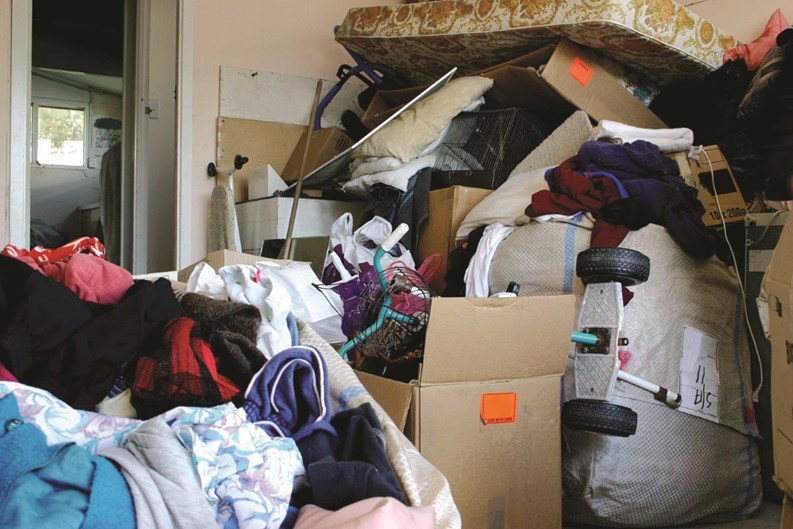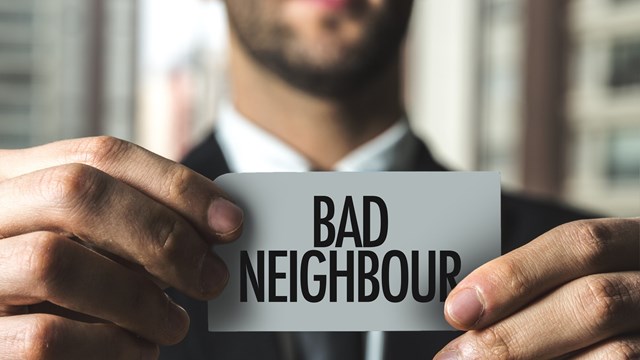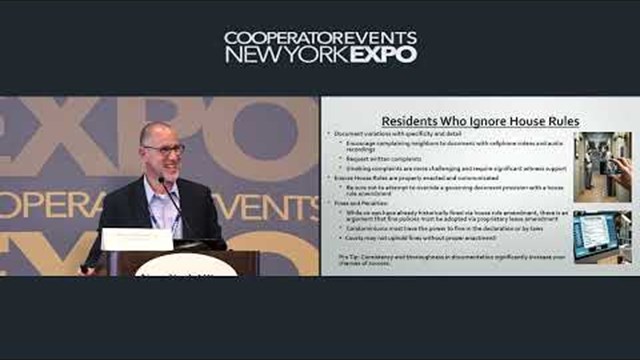Bad neighbors are something that everyone living with shared walls fears—and not without cause; co-op or condo, small or large, chances are there's at least one chronically objectionable person who seems to do his or her level best to annoy, thwart, and agitate his or her neighbors, and otherwise disrupt the peaceful functioning of the community.
Thing is, the term 'objectionable' is a subjective one. In the context of a multifamily condo building or homeowners association, the behavior that can fall under that label ranges from constant noise and cooking smells to full-on hoarding, or even assaulting neighbors or board members in the lobby.
Obviously, punching or threatening someone is an actionable offense—as is drug dealing, or running an unlicensed business out of one’s home. Residents who are a perpetual pain-in-the-neck, who constantly bicker with their neighbors over every little thing, or whose behavior stems from unaddressed mental illness or other situations may not be illegal, but their behavior still negatively impacts the quality of life in their building.
However, there are ways both managers and boards can handle seemingly unmanageable situations in their building or community, helping those in need of help while avoiding exposure to liability themselves.
Enforcing the Rules
One of the most common issues in community associations is rule enforcement—but ironically, industry surveys show that fully 90 percent of residents in community associations recognize that such rules protect the value of their unit and provide for the quiet enjoyment of their property, says Andrew Fortin, senior vice president of communications at Associa, a nationwide association management company with two New York offices.
“At the same time, the old adage that rules are made to be broken also plays a part,” Fortin says. “Folks strongly support rules, but then will seek exemptions for an issue that's particularly close to their heart.” Issues that commonly set off arguments between neighbors are often exterior items like clotheslines, political signs, satellite dishes and solar arrays that people feel are unsightly, or that somehow infringe on their private property.
A badly-placed clothesline is one thing but the biggest issues that Martin Kera, a partner with the Manhattan-based law firm of Kera & Graubard, has seen involve noise and smoking. One neighbor will say that smoke from a neighboring unit gets through to theirs, or another neighbor will complain about the noise of kids riding their tricyles or playing a musical instrument at all hours of the night, Kera says. It’s difficult to live in a building without hearing or smelling one’s neighbors but some are louder or more malodorous than others—and sometimes, this can reach unacceptable levels.
“But it is usually the word of one person against another,” he points out, which makes these types of cases incredibly difficult and frustrating for everyone involved when attempting to mediate the issue.
Elderly or aging residents also have special needs sometimes that can cause problems for their neighbors. Physical or mental health issues can both undermine the safety of the building and create problems for those living there, says Rebecca Eddy, MBA, PDDM, a partner with Eddy & Schein, a Manhattan-based elder care service that provides in-home administration and financial assistance for seniors. Three major problems that managers may face include clutter, cleanliness and safety issues, Eddy says.
A senior resident’s memory loss or dementia can lead perhaps to a fire, from leaving a pot unattended on a stove. An elderly smoker can fall asleep and leave a cigarette burning in their unit. A cluttered apartment can also become a fire hazard, says Eddy.
Stop the Presses...and Mental Matters
Residents of an association have the right to participate in meetings, vote on key issues and have a responsive board—but you can’t please everyone all the time. Community associations are a form of corporate representative governance, Fortin says, and as in any democratic institution, there will nearly always be a minority on any given issue. However, even when someone strongly disagrees with the course of action or decision by the board, “they still understand the process, and if they felt that their concerns were heard, don't typically create a fuss,” he continues. Sometimes however, things take a turn into problematic territory.
The line is crossed when a disgruntled resident stops debating the issue civilly and starts making personal and/or defamatory statements about the board or a manager. “A group of residents who disagree with an outcome might form their own rogue board, set up a rival association Facebook or web page and engage in actions that can be deemed libelous or threatening,” says Fortin. “When such statements are published electronically via social media, it may become a legal issue. While not common, such personal attacks may require the board to seek a cease and desist letter.”
Sometimes, Fortin says, an owner or group of shareholders may opt to turn an internal dispute into a media event, calling the press—or legislators, in some cases—to air their grievances and draw attention to themselves. “The result is negative media coverage of community associations, or new laws that limit the autonomy of residents to govern their own community.”
Folks who reject rules they don't like are one thing but neighbors who are dealing with untreated mental illness or emotional disturbances present a singularly difficult issue for boards and managers to cope with because they may not comprehend the rules in the first place.
Fortin shares a story from a colleague in the industry about a situation that started off looking like a not-that-unusual case of neighbor-vs-neighbor conflict, but wound up being something much more serious.
“This condo had to deal with a resident who was dissatisfied with the outcome of a dispute with a neighbor,” he says. “So she began sending emails to the media, competing management firms and others claiming the outcome was a result of bias by the board due to her sexual orientation. The emails were very strong, and included terms like ‘liars,’ ‘bigots,’ ‘illegal discrimination,’ among the more gentle words used.”
While the manager intervened and tried to hire a mediator to resolve the issues, the situation continued to deteriorate, and eventually it became clear that there was much more afoot than just a spat between neighbors; indeed, at one point the aggrieved resident ended up being involuntarily committed to a mental health care facility.
Other notoriously difficult neighbor behavior includes hoarding situations, chain-smoking and unruly animals. But tough as those issues can be to address and correct, there’s a difference between a cranky cat lady and someone who's doing something that's outright illegal and poses a serious threat to the safety and security of the entire community.
If this is the case, the legal pros agree that a board member, manager, or even a neighbor should contact the authorities immediately; it's well beyond the job description (and pay grade) of anyone but the police, and as such it's the police who should investigate and sort out the situation.
Counseling vs. Legal Counsel
In most situations, all but the most troubled residents can be handled internally by a responsive board and a competent manager. According to Fortin, managing agents are typically the first responders to a situation involving a difficult resident. “This highlights the truly unique role that the community association manager plays, and highlights the challenges of their job,” he says. After all, managers assist with producing budget and financial statements, understand how to run a meeting, have a working knowledge of governing documents and applicable state statutes, and often serve as counselors or mediators in highly-charged disputes.
Eddy recommends that managers maintain complete and current emergency contact information for senior residents; provide educational seminars for boards on how to deal with aging residents; maintain a list of referral and social service organizations to which a board can turn to for help; and review the building’s accessibility to help less mobile and special needs residents in the event of an emergency. The manager should also do a periodic review to identify those in need of care or to determine if a senior resident’s living situation has changed.
“Early intervention not only protects the building and all its residents, but proactive measures allow seniors to continue to live in their apartments safely and comfortably,” Eddy says.
When All Else Fails…
Sometimes however, an attorney needs to get involved—though the remedies are different in a condo and in a co-op, says Steven Chase, a partner with the law firm of Kramer & Shapiro, P.C. in Kew Gardens. In a co-op, you’re allowed to bring a problem shareholder to housing court, where the owner can be threatened with eviction, in the form of revocation of their proprietary lease. In a condo, you can’t go to housing court because the individual unit owner owns each unit outright—so you have to go to Supreme Court.
“In both cases, the way to get there is to create a paper trail,” Chase says. “If a neighbor or people are complaining, their complaints have to be put into writing.” Those written records should be kept on file by the board and attorney for use as evidence when and if court proceedings are brought.
Even with a case file a foot thick however, it’s often difficult to press a case against a troublesome resident, Kera says. “This isn’t just, ‘Hire an attorney.’ You have to be willing to take off a day of work and come and testify, and usually no one will come to court,” he says. “It’s very difficult to evict someone” from a co-op.
The pros—attorneys though they are—agree that it’s always best not to let an issue escalate to the point of litigation, which is why making sure that your board/management team knows how to handle resolutions effectively is so important. Most say that it's very helpful for boards to have a closed meeting to discuss candidly how to deal with difficult people or situations, and to have a basic understanding of conflict resolution methods.
While some folks seem to have these skills naturally, for others there are resources available, including conflict resolution courses hosted by a law firm, a state agency or sometimes by management companies themselves. The Cooperator frequently offers seminars on resolving conflict at its annual Co-op & Condo Expo—seminars are free, and include a Q&A section for attendees to ask a panel of legal experts just about anything related to the law.
Dispute Resolution
If two neighbors are feuding, the board has an obligation to assist with conflict resolution if the dispute involves areas in which the association has an obligation or an authority to act. “Enforcing architecture standards is a great example, as is maintenance and care for the unit or its façade,” Fortin says.
But boards don’t have an obligation to get involved in disputes that are unrelated to the authority or duties of the association—spats that involve personality conflicts, for example. When they do get involved, there are effective and non-effective ways to do mediate conflict between neighbors, which is why associations should have a clear—and ideally a written process—for handling complaints. Such a process is often referred to as an alternative dispute resolution process (ADR). Some states even mandate that a community association adopt a formal ADR process for residents.
“Having a clear and consistent process for resolving disputes between neighbors related to the association rules, or between a resident and the board helps set expectations, provides transparency of process and ensures residents have a consistent process available,” Fortin says. “Most issues are aggravated not by the resolution, but rather by the lack of clarity on how to engage in resolution. This vacuum of information allows residents to project their fears and insecurities into the void, which only adds fuel to the fire.”
Danielle Braff is a freelance writer and a frequent contributor to The Cooperator. Managing Editor Debra A. Estock contributed to this article.










Leave a Comment